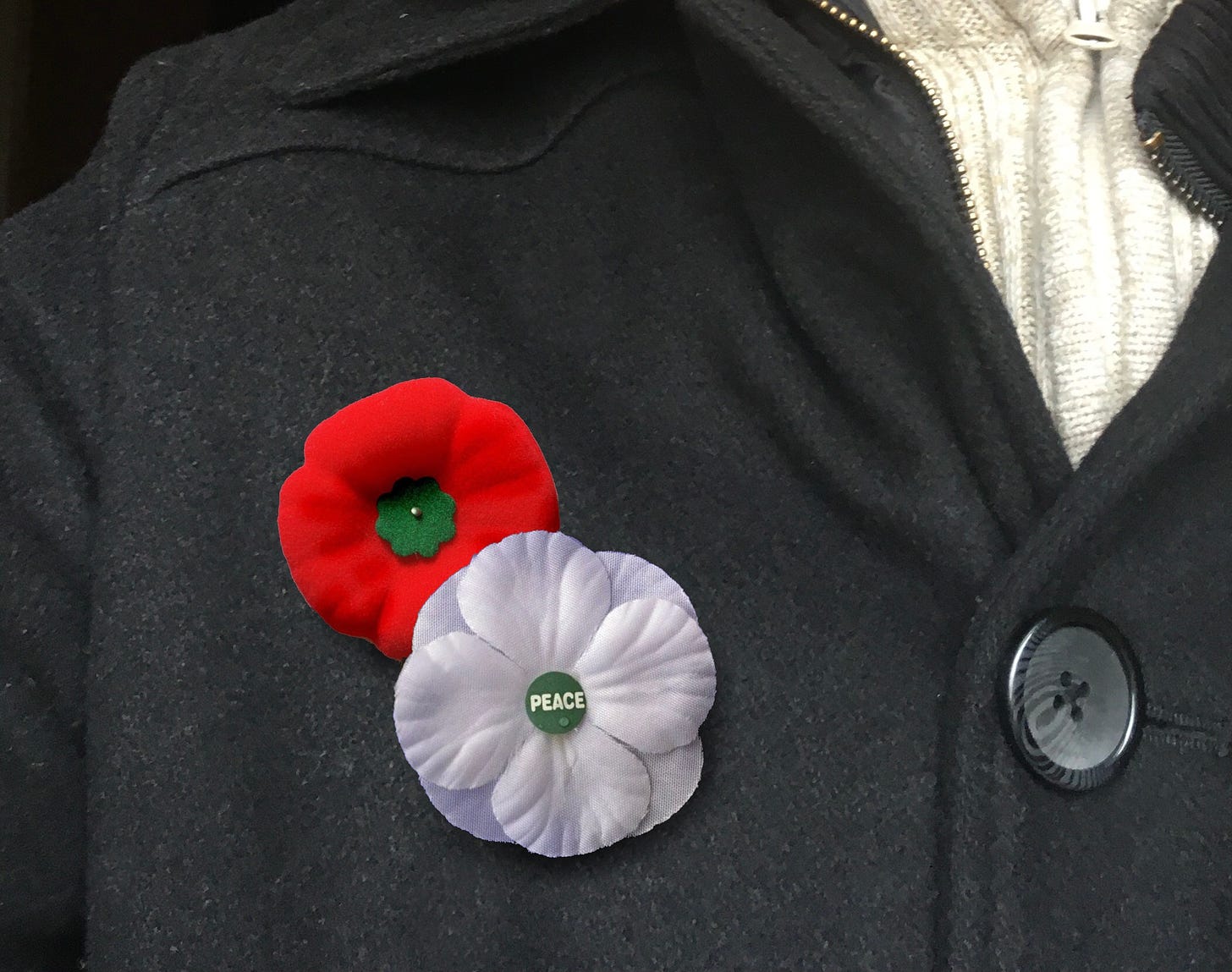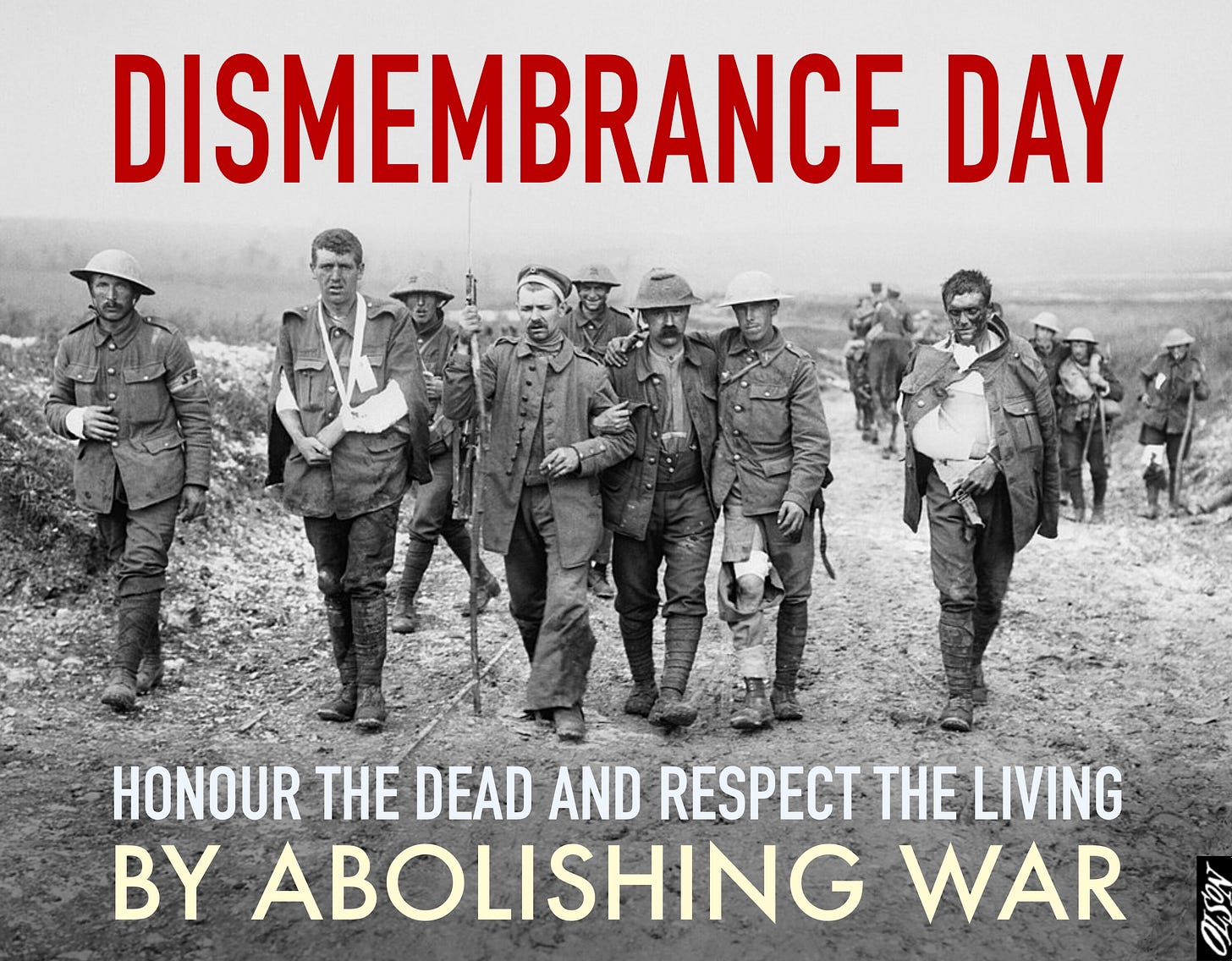Red Poppy, White Poppy
On Remembrance Day, shouldn’t we also acknowledge the civilians killed in wars? And promote ending wars while honouring veterans?
“Remembrance Day (also known as Poppy Day owing to the tradition of wearing a remembrance poppy) is a memorial day observed in Commonwealth member states since the end of the First World War to honour armed forces members who have died in the line of duty” - Wikipedia
Like many other Canadians I’ve worn a red poppy before and on Remembrance Day, almost as a seasonal reflex. Yet my enthusiasm for the custom has faded over time, though not my respect for Canadian military veterans.
The poppy first appeared in 1920 as a symbol of remembrance of World War 1. It was inspired by the 1915 poem, In Flanders Fields, by Canadian physician and Lieutenant Colonel John McCrae. He observed that poppies were the first flowers to grow in the shell-tilled earth of soldiers’ graves in Flanders Field, a region that crossed French and Belgian territory. Paper versions of the flower were first used by the American Legion to commemorate American soldiers who died in World War 1. Military veterans’ groups in the Commonwealth adopted the custom shortly thereafter for their commemorations on November 11, the day of armistice in 1918.
What follows are nine 9 problems with the red poppy, and how the white poppy is a wise alternative/addition.
1) The red poppy doesn’t honour civilians
Civilian deaths from the conflicts of the 20th and 21st centuries far outnumber the military deaths, by tens of millions. Needless to say, there’s no holiday to acknowledge the involuntary sacrifice of these mostly forgotten souls.
2) The red poppy doesn’t honour the sacrifice of nonCommonwealth soldiers
Soldiers on the ‘wrong side’ of any given conflict are invariably seen as losers in terms of their state/social programming, to say nothing of actual defeat. Yet if you squint your eyes, you can see them as heroes in terms of personal sacrifice, beyond the ‘rightness’ or ‘wrongness’ of their cause. For generations, courageous men and women have been propagandized into fighting for God, Pope, Emperor, King, Queen, Kaiser, Reichsfuhrer or a moving set of lines on a map.
At its outset, the custom of poppy-wearing honoured brave young men from the ‘right side’ who killed other brave young men from the ‘wrong side’. But in failing to acknowledge the latter, it fails today’s test of religious, ethnic and national inclusivity.
3) Remembrance Day was birthed to commemorate the WW1 armistice
In 1914, a complicated patchwork of national alliances exploded into a land war in Europe, resulting in 37 million military and civilian casualties in just four years. In the meat grinder of trench warfare, the ammunition of opposing sides was worn down by a fusillade of young male bodies. The only ones to profit from this madness were the plutocrats, industrialists and demagogues of the warring nations, along with oil barons focused on the “Great Game” in central Asia.
The day that commemorates the armistice and the astounding courage of the era’s soldiers fails to condemn one of humanity’s greatest catastrophes, which set the stage for the Holocaust and World War 2 a few decades later.
4) A Commonwealth symbol for remembrance involves acts of forgetfulness
The defeat of the genocidal German leader Adolph Hitler was a tremendous victory for the world. Yet the Nazi regime couldn’t have built up its industrial base without foreign help. Charles Higham’s 1983 book, Trading With The Enemy: An Expose of the Nazi-American Money Plot, 1933-1949, offers an astounding list of subversive activities by Anglo-American industrialists and bankers.
Here’s one big one. Thomas Harrington McKittrick, American president of the Bank for International Settlements, travelled freely among Axis and Allied countries throughout the war on a special visa, free from interference - even while the BIS was putatively under Hitler’s control.
Hitler, a failed watercolour painter with a brush moustache, won over the German people with his petit mal oratorical style. He expertly captured and channelled their nationalistic resentments and ethnic bigotries with his charismatic lunacy. But he was aided and abetted by western interests, just as similar interests supported the rise of Saddam Hussein in Iraq a half-century later, along with many other usesful despots, from Panama’s Manuel Noriega to Haiti’s Papa Doc Duvalier. Invariably, Empire plays the profitable role of both arsonist and fire chief.
5) War is toxic to democracies, even for the victors
Until August 1914, a sensible, law-abiding Englishman could pass through life and hardly notice the existence of the state, beyond the post office and the policeman. He could live where he liked and as he liked. He had no official number or identity card. He could travel abroad or leave his country forever without a passport or any sort of official permission. The Englishman paid taxes on a modest scale: nearly £200 million in 1913-14 or rather less than eight percent of the national income.”
- historian A.J.P. Taylor in English History 1914-1945.
The First World War altered the dynamic between citizen and state, and not just in Britain. The US Sedition Act was passed in May of 1918, mere months before armistice. The Act was later used as a tool for the arrest, imprisonment, execution and deportation of dozens of unionists, anarchists and communists. It became a bludgeon used to criminalize “antipatriotic’ and “antiwar” speech.
There was also the undemocratic post-WW2 fallout on the US press, as noted by Ben Bagdikian, Dean Emeritus of the University of California, Berkeley Graduate School of Journalism.
The incestuous relationship of the Monopoly Media Cartel and psychological warfare has a long history. Veterans of World War II, for example, the US Army’s Psychological Warfare Division, became the Cold War’s media giants. OSS agent William S. Paley became a CBS executive. C.D. Jackson [an expert on psychological warfare who served in the Office of Strategic Services in World War II] worked at Time/Life…William Casey was an executive at Capital Cities, which merged with ABC and subsequently devoured by Disney. Casey himself, of course, became Director of the CIA.
- Ben Bagdikian, The Media Monopoly, 1983.
In the US, the growth of the military-industrial complex has run in tandem with increased domestic surveillance, decertified unions, the militarization of police departments, the infiltration and monopolization of the independent press, the sacking of Treasury finances and the concealment of state and corporate crimes under the banner of national security. These trends accelerated after 9/11 and went into overdrive with the Covid mandates from 2020 on.
As Edward Curtin observed in a recent essay:
The United States government exists to wage war. In its present form, it would crumble without it; and in its present form, it will crumble with it. Only a radical structural change will prevent this. For war-making is at the core of its budget, its raison d’être – 816.7 billion for the Fiscal 2023 National Defense Authorization Act alone – a deficit-financed sum that tells only part of the story. This amount that finances the military-industrial complex and its blood money is for a country that has never been invaded, is bordered by friendly neighbors, and is oceans away from the multitude of countries its leaders attack and call our enemies. The U.S. wages wars around the world because killing is its lifeblood, its structural essence.
6) There’s no glory in war
And if there was, the sons and daughters of the rich and powerful would be the ones on the front lines, not the cannon fodder drawn from rural areas and inner city trouble spots. Young people with minimal employment options sign up for the armed services; the lucky ones get an education behind the lines, while the unlucky ones get theirs in dustblown hell-zones.
A quarter of the returning soldiers of the Bush-era wars, Canadians and Americans alike, experienced mental health problems ranging from suicidal thoughts to unmanageable anger or some other variant of PTSD, with the prospect of diminishing post-combat support from their governments.
7) There will be no ‘World War 4’
When historians began to optimistically number World Wars, it was a clear sign of a need to rethink a Sesame Street approach to global conflagrations. How can we support a seasonal sentimentalism about military sacrifice that doesn’t explicitly condemn war’s future potential to destroy civilization, if not the human race?
8) Poppies’ other connection to war
The poppy bulb is the source of opium, a narcotic drug long connected with wars in central/southeast Asia. In the mid-1800s, Britain went to war with China to force the Chinese government to continue importing their opium cultivated in India. Trafficking of the narcotic in its refined form as heroin has continued to haunt military adventurism to the present day, from Vietnam to Afghanistan. Drugs and war are intertwined in the shadow economy, with drug trafficking supplying billions of dollars of liquidity to the global banking system through laundered funds.
9) “Thou Shalt Not Kill”
How is it the Old Testament’s Sixth Commandment jibes with Onward Christian Soldiers and other crusade-friendly memes of the industrialized west? Judeo-Christianity is still the dominant ethos in North America, especially among the warrior class hailing from small town America. Ironic that a commandment supposedly written in stone (on Moses’ tablets) is never cited during the media ballyhoo that precedes every military engagement.
An alternative or addition to the red poppy
There are many thousands of red poppy-wearing veterans who march in parades for peace, attend antinuclear rallies and the like. I respect the contributions, past and present (but hopefully not the future) of all veterans, just as I respect their choice to wear a red poppy. I’m not arguing in favour of ‘cancelling’ Remembrance Day, but I am arguing we expand its meaning in our hearts and minds.
There’s an alternative or addition to the red poppy. In 1933, Britain’s Co-operative Women’s Guild introduced a wearable white poppy and white poppy wreaths as pacifist symbols. White poppies are increasingly available - and they can be handmade out of paper, of course.
White poppy wreath-laying ceremonies across the world are meant to include the civilians who now make up 90% of conflict victims, and to challenge the beliefs, values and institutions that make wars possible.
“Most wars in the 20th century have started as a result of lies,” observed Wikileaks founder and political prisoner Julian Assange in a 2011 interview with Google executive chairman Eric Schmidt. “Amplified and spread by the mainstream press… populations basically don’t like wars and they have to be lied into it. And that means we can be truthed into peace.”
White poppies, anyone?
(Revision of an article originally in Common Ground, Nov. 2013)








Beautiful Geoff. Thanks so much for such a moving article articulating the many blind spots we have about Remembrance Day. In Flanders Fields is one of the most beautiful poems ever written. When I read it, I cry for our collective wounds, sorrows and stupidity that lead us to war in the first place. And just the seeming futility of overcoming aggressive impulses that are manipulated by self serving powers that be.
Thank you very much Geoff for your work and power of observation. You are a great teacher, inspiring us to think about the topics you discuss. We should also remember Russian civilian and defending soldiers lives lost during the second world war, all victims of Nazi aggression.